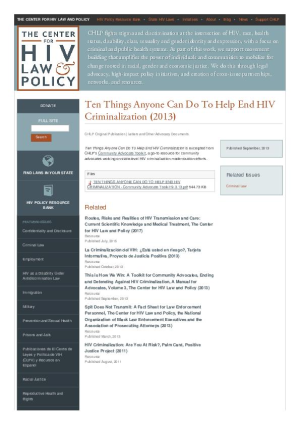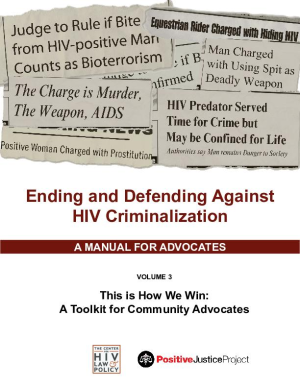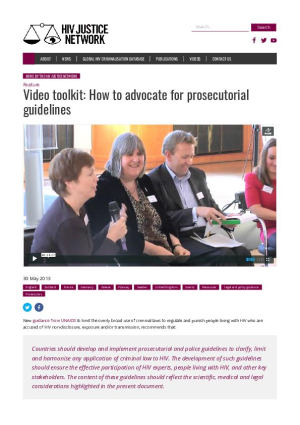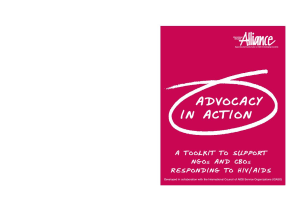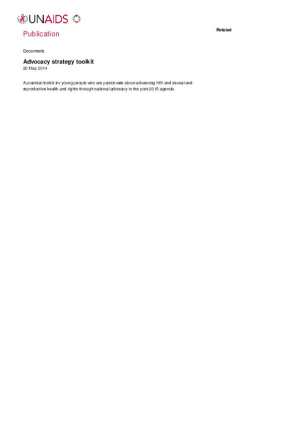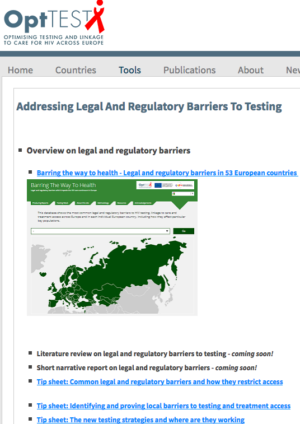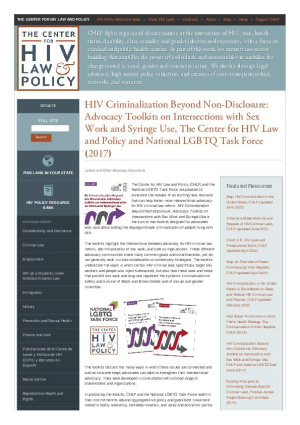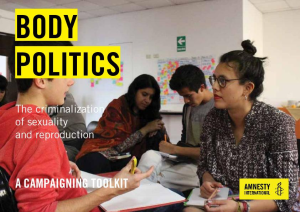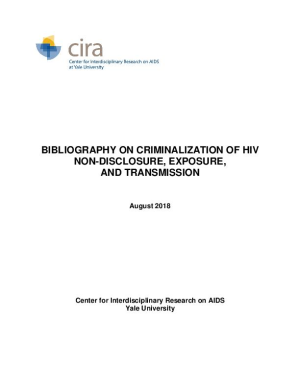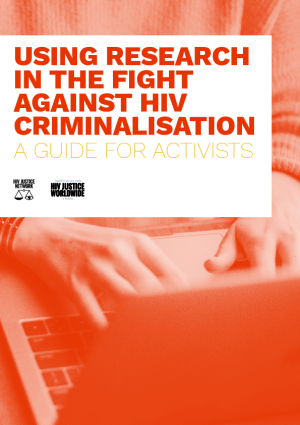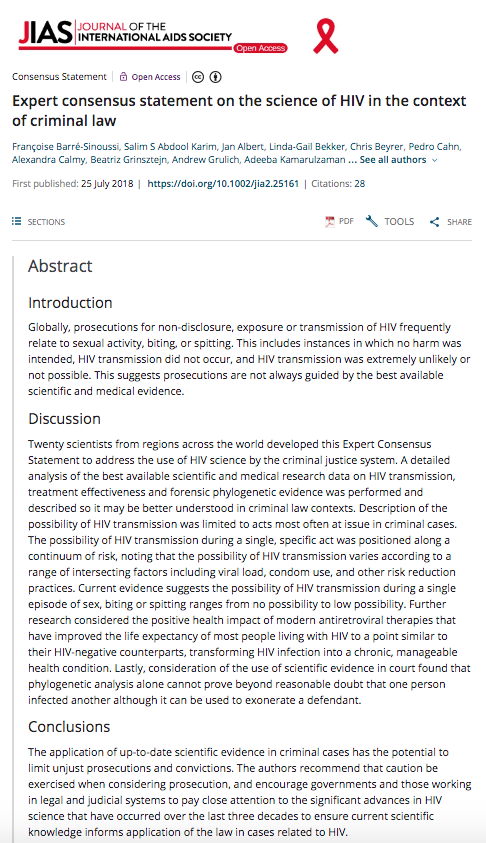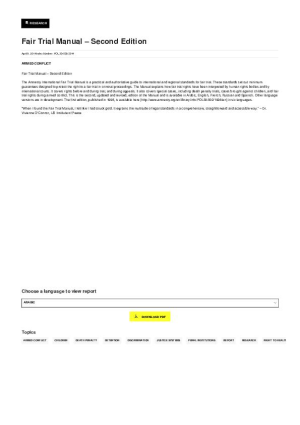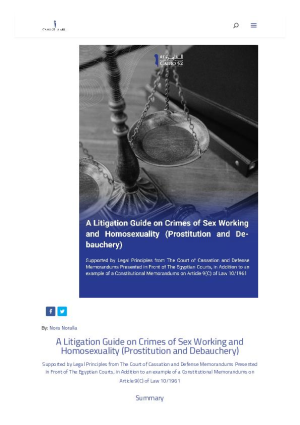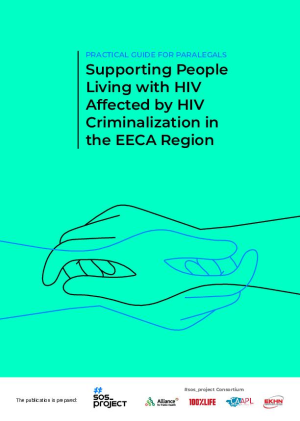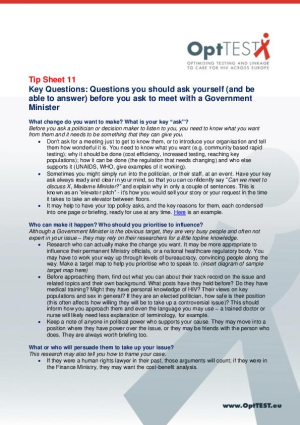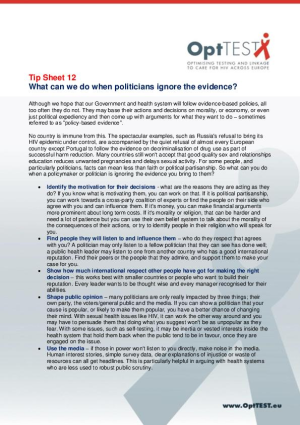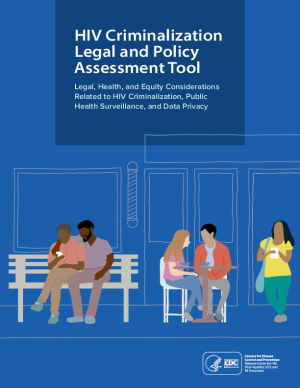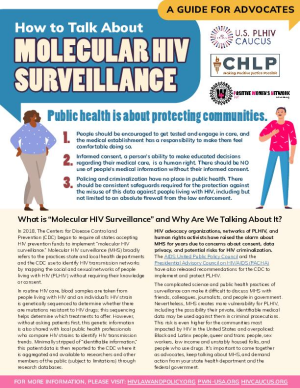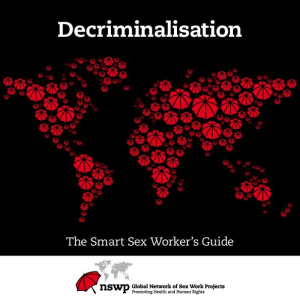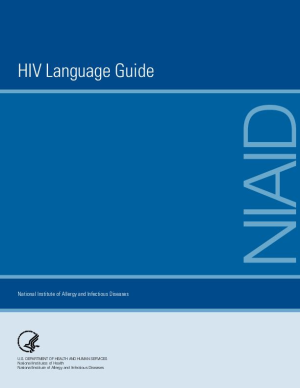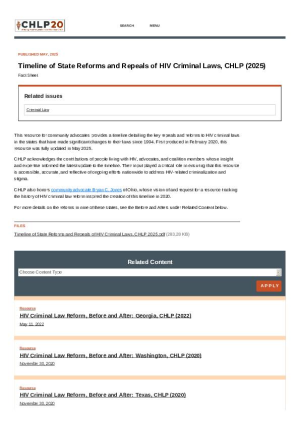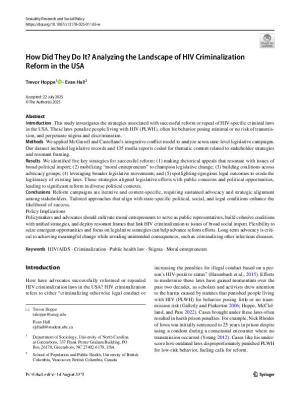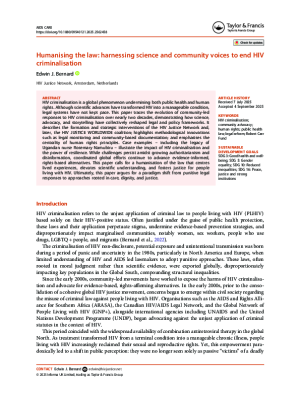This short guide from The Center for HIV Law and Policy published in 2013 provides suggested actions to further advocacy against HIV criminalisation, with associated resources.
Advocacy and activism
Tools and resources for advocacy
Ending and Defending Against HIV Criminalization: A manual for advocates. Vol 3: This is how we win. A Toolkit for community Advocates
Contains numerous criminalisation documents (also listed separately on this site), including Ten things anyone can do to help end HIV criminalization, How a Bill becomes a law, State-level legislative advocacy cheat sheet, How to talk about HIV criminalization with elected officials, media and others.
How to advocate for prosecutorial guidelines
This video toolkit comprises a workshop held during a seminar on HIV criminalisation in Berlin in September 2012 to discuss challenges associated with the creation of prosecution guidelines, providing important insights from prosecutors and civil society alike. The workshop followed the European premiere of the documentary ‘Doing HIV Justice: Clarifying criminal law and policy through prosecutorial guidance’ which explores how prosecution guidelines were created for England and Wales
Advocacy in action: A toolkit to support NGOs and CBOs
This toolkit, produced jointly by the Alliance and the International Council of AIDS Service Organizations (ICASO), shows NGOs and CBOs how they can use advocacy to influence people in power, to create an environment that protects the rights, health and welfare of everyone, whether HIV positive or negative. It sets out to build practical skills, provide a training resource and continue learning.
Advocacy strategy toolkit
A practical toolkit for young people who are passionate about advancing HIV and sexual and reproductive health and rights through national advocacy in the post-2015 agenda.
- Alternative links
- Spanish/Espanol
OptTEST: Addressing Legal And Regulatory Barriers To Testing
This EU-funded project on improving access to testing and treatment continuum includes some detailed and informative HIV criminalisation case studies (Netherlands, Denmark and England & Wales) as well as nine advocacy tip sheets such as 'Simple principles for effective campaigning', 'Getting the evidence for policy changes' and 'What can we do when politicians ignore the evidence?'
The Intersection of Sex Work and HIV Criminalization: An Advocate’s Toolkit
This 2017 toolkit from The Center for HIV Law and Policy (CHLP) and the National LGBTQ Task Force highlights intersections between the criminalisation of sex work and HIV, noting both disproportionately affect people from marginalised communities. Urges the building of stronger linkages across HIV criminalisation and sex work movements, and provides tips to make advocacy more inclusive, effective, collaborative and transformative.
Body Politics: The Criminalisation of Sexuality and reproduction – A campaigning Toolkit
Provides concrete campaigning techniques such as mapping stakeholder participation and power, identifying advocacy targets, and building capacity
Bibliography on Criminalization of HIV Non-Disclosure, Exposure, And Transmission
Overview of resources outlining criminal laws and analyses of case laws; empirical research in the US and Canada; legal and public health analyses; guidance, fact sheets and talking points; policy and consensus statements, and other relevant references on criminalization in a North American context.
Using Research In The Fight Against HIV Criminalisation – A Guide for Activists
The purpose of this guide is to help advocates who want to use research in their activism. It is not a guide about how to conduct original research. Instead, it focuses on how to find, read and interpret research on HIV criminalisation, giving examples of how advocates have successfully used research to challenge HIV criminalisation.
HIV Is not a Crime – Modernize Nevada’s HIV Criminal Laws
Talking points to help activists advocating against Nevada's HIV Criminal Laws.
HPV Talking Points – Keep out of the criminal law
HPV Talking points published by the HIV Modernization Movement-Indiana to support advocacy against bill attempting to add HPV to outdated HIV or STD criminal laws (other than the specific epi/medical/testing facts unique to HPV, many of these talking points would apply to attempts to add any additional communicable diseases to these criminal laws).
Expert consensus statement on the science of HIV in the context of criminal law
Twenty scientists from regions across the world developed this Expert Consensus Statement to address the use of HIV science by the criminal justice system. Description of the possibility of HIV transmission was limited to acts most often at issue in criminal cases. The authors recommend that caution be exercised when considering prosecution, and encourage governments and those working in legal and judicial systems to pay close attention to the significant advances in HIV science that have occurred over the last three decades to ensure current scientific knowledge informs application of the law in cases related to HIV.
- Alternative links
- Czech: Expertní prohlášení k vědeckým poznatkům o HIV v kontextu trestního práva , French: Déclaration de consensus d'experts sur la connaissance scientifique relative au VIH dans le contexte du droit pénal, German: Expertenkonsens zur HIV-Wissenschaft im Kontext des Strafrechts, Mandarin: 專家共識聲明:刑法脈絡下的愛滋相關科學, Russian: Заявление об экспертном консенсусе в отношении научных данных о ВИЧ- инфекции в контексте уголовного права , Spanish: Declaración de Consenso de expertos sobre la ciencia relativa al VIH en el contexto del derecho penal
The Intersection of Syringe Use and HIV Criminalization: An Advocate’s Toolkit
This 2017 toolkit from The Center for HIV Law and Policy (CHLP) and the National LGBTQ Task Force highlights intersections between the criminalisation of injecting drug use and HIV, noting people living with HIV who inject are criminalised in multiple ways including by laws targeting sharing equipment; purchasing, possessing or distributing equipment; drug possession and use; and HIV exposure, non-disclosure and transmission. Notes repeated calls to address substance use as a public health issue, and provides tips to make advocacy more intentional, intersectional, inclusive, and effective.
Fair Trial Manual – Second Edition
This Manual seeks to provide a practical guide to the relevant human rights standards for anyone involved in examining how well a criminal trial or a justice system meets international standards of fairness. It is intended for the use of trial observers and others assessing the fairness of an individual case, as well as for anyone seeking to evaluate the extent to which a country’s criminal justice system guarantees respect for international standards of fair trial. It may also serve as a guide for law makers, judges, prosecutors and defence lawyers or as a training tool.
New Tech Brief: Roadmap for Key Populations Advocates Navigating the Global Fund
This technical brief seeks to provide an overall snapshot of how the Global Fund mechanism works, to help key populations navigate the pathway to securing funding for their work. It offers toolkits, policy briefs, trainings and other materials that explain different steps of that process in more detail. It also includes case study examples of successful key population programs supported by the Global Fund, in hopes that they inspire creativity, innovation and persistence in driving this work forward.
A Litigation Guide on Crimes of Sex Working and Homosexuality
This an English Summary of the book “A Litigation Guide on Crimes of Sex Working and Homosexuality (Prostitution and Debauchery) “. The book aims to provide a litigation guide and a legal overview of principles and procedures to legal advocates and whoever wishes to know more about “prostitution” or “debauchery” crimes under Egyptian law.
PRACTICAL GUIDE FOR PARALEGALS: Supporting People Living with HIV Affected by HIV Criminalization in the EECA Region
The purpose of this guide is to raise the legal awareness of activists from the community of people living with HIV who provide paralegal assistance to people affected by the criminalisation of HIV. This guide is also recommended for use by activists from key populations - people who use drugs, sex workers, and representatives of the LGBT community. This manual reflects the experience of the HIV-positive community members, as well as their partners and associates from across Eastern Europe and Central Asia (EECA), in providing direct assistance to HIV-positive people affected by discriminatory HIV-specific laws and the decriminalisation of HIV.
OptTEST Tip sheet 11 – Key Questions: Questions you should ask yourself (and be able to answer) before you ask to meet with a Government Minister
Document exploring how to prepare meeting with government officials.
OptTEST Tip sheet 12 – What can we do when politicians ignore the evidence?
Examples of strategies to resist or challenge poor decision making.
OptTEST Tip sheet 7 – How and where do I find evidence for a change in policy?
Explores how to change existing policy by presenting clear and understandable evidence to support advocacy.
HIV Criminalization Legal and Policy Assessment Tool
This assessment tool is designed to help individuals and organizations, including state and local health departments, to assess the extent to which a jurisdiction’s laws and regulations impede HIV surveillance, facilitate privacy breaches, or criminalize HIV infection and related risk behaviors.
How to talk about molecular HIV surveillance: a guide for advocates
A guide for advocates and people with HIV on how to raise concerns about MHS and speak about the issues.
Smart Sex Worker’s Guide to Decriminalisation
This Smart Guide provides an overview of existing sex work legal models and details the processes that have been used to develop legislative models that respect and protect sex workers’ human and labour rights. It aims to provide sex workers’ rights organisations with ideas and strategies that they can adapt to their own legal framework and context, to use in their advocacy and campaigning in their own countries. It also highlights the learning and best practices from both New Zealand and Australia, as well as the potential challenges and pitfalls involved in pursuing a decriminalisation advocacy strategy.
A comprehensive methodology for monitoring social media to address and counter online hate speech
"A Comprehensive Methodology for Monitoring Social Media to Address and Counter Online Hate Speech” aims to set up a systematic and common approach for monitoring hate speech in full respect of international human rights law and standards and based on the UN Strategy and Plan of Action on Hate Speech. It is envisaged to help the work of various UN entities, and all relevant stakeholders engaged in tackling hate speech, including by providing examples on how to do this practically. It also provides an opportunity to reflect on what areas would benefit for further research and action to advance the fight against online hate speech globally.
HIV Language Guide
This guide includes language suggestions for communicating about HIV and related topics. It aims to help scientists, administrators, and researchers use fair, accurate, and respectful language and aid funded research networks, sites, centres, investigators, and stakeholders as they draft protocols and develop communications and outreach materials. The Language Guide describes current thinking and best practices and procedures.
Timeline of State Reforms and Repeals of HIV Criminal Laws, CHLP (2025)
This resource for community advocates from CHLP outlines a timeline of major repeals and reforms to HIV criminal laws in US states that have implemented significant changes since 1994. Originally released in February 2020, it was fully updated in May 2025.
How Did They Do It? Analyzing the Landscape of HIV Criminalization Reform in the USA
This study investigates the strategies associated with successful reform or repeal of HIV-specific criminal laws in the USA.
Background to prosecution and the law
Published by the Terrence Higgins Trust, these pages gives you information on what you should do if you’ve been accused of HIV or sexually transmitted infection transmission, along with the names and coordinates of organisations who can help support you in the United Kingdom and background information on prosecution and the law.
The section covers:
- How the law works.
- When prosecutions succeed.
- When prosecutions fail.
- How do you prove it?
- I've been accused.
- I want to complain.
- I've been asked to be a witness.
- Views on prosecutions.
Humanising the law: harnessing science and community voices to end HIV criminalisation
This paper traces the evolution of community-led responses to HIV criminalisation over nearly two decades, demonstrating how science, advocacy, and storytelling have collectively reshaped legal and policy frameworks.It describes the formation and strategic interventions of the HIV Justice Network and, later, the HIV JUSTICE WORLDWIDE coalition; highlights methodological innovations such as legal monitoring and community-based documentation; and emphasises the centrality of human rights principles. Case examples - including the legacy of Ugandan nurse Rosemary Namubiru - illustrate the impact of HIV criminalisation and the power of resilience. While challenges persist amidst growing authoritarianism and disinformation, coordinated global efforts continue to advance evidence-informed, rights-based alternatives. This paper calls for a humanisation of the law that centres lived experiences, elevates scientific understanding, and fosters justice for people living with HIV. Ultimately, this paper argues for a paradigm shift from punitive legal responses to approaches rooted in care, dignity, and justice.

